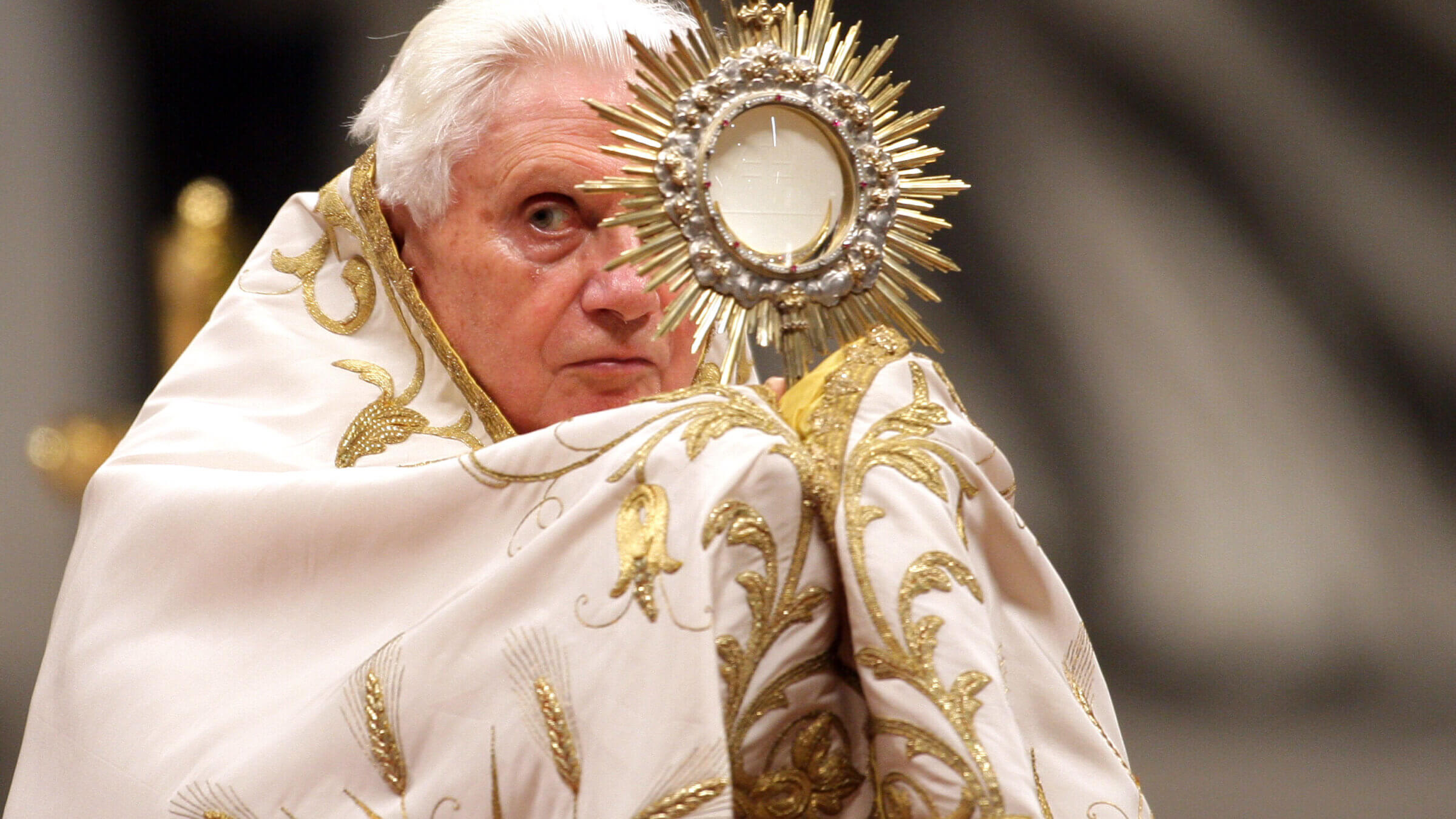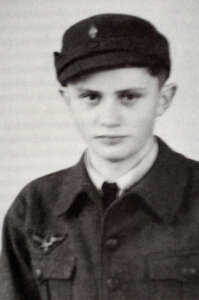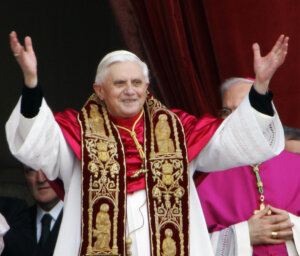So, how was Pope Benedict’s record on Jews anyway?
The pontiff said he believed in Jewish and Christian co-existence — but it took quite a while for him to get there

Pope Benedict XVI leads the First Vespers and Te Deum prayers at St. Peter’s Basilica on December 31, 2009 in Vatican City. Photo by Getty Images
When the former pontiff, Pope Benedict XVI, died on New Year’s eve at age 95, Pope Francis lauded him for being, among other things, a “kind” person (gentile in Italian). To paraphrase Blanche Dubois in A Streetcar Named Desire, should Jews always depend on the kindness of popes?
Born Joseph Aloisius Ratzinger in Marktl in Upper Bavaria, Benedict joined the Hitler Youth organization of the Nazi Party when he was 14, although historians disagree on whether his membership was entirely compulsory or voluntary at the time. Far less publicized later would be his conscription at 16 into anti-aircraft duties in Munich and subsequent drafting, at 21, into the Nazi military.
He told a biographer that his infantry service was “relatively harmless” insofar as he was never sent to the front, nor did he ever fire a shot, according to his account. Still, Benedict remained reticent about personal confrontations with Nazism, especially compared to his predecessor Pope John Paul II, who often spoke of the German occupation of his native Poland.
Even during a 2009 visit to Yad Vashem, Israel’s official memorial to Holocaust victims, Benedict’s comments were vague and perfunctory, omitting any autobiography or even mention of Germans and Nazis, let alone church collaboration in the Holocaust or the annihilation of European Jewry.
Worse, Benedict refused to set foot in the Yad Vashem museum, because he was informed that it contained an exhibit critical of his predecessor Pope Pius XII’s actions — and inactions — during the Holocaust. While historians continue to debate Pius’s response to the annihilation of Europe’s Jews, Benedict adamantly advocated Vatican policy to lionize Pius. Benedict did the same for years as John Paul II’s head of the Vatican Congregation for the Doctrine of the Faith (CDF). This body sanctioned American nuns and other Catholics who opposed ultraconservative church doctrine.

During these CDF years, the international press began calling then-Cardinal Ratzinger by unflattering nicknames like “God’s Rottweiler” and “The German Shepherd.” Although mild-mannered in personal meetings, which may have inspired optimism among Jewish leaders who encountered him, Benedict proved exceedingly determined in his reactionary agenda. He accelerated the process of canonization for Pope Pius, regardless of protests.
He held brassbound religious viewpoints tenaciously throughout his career. In 1987, during the AIDS pandemic, Benedict vehemently claimed that the Catholic Church must reject condom use as a preventive against viral transmission; condoms would cause AIDS, he said, by the “facilitation of evil.” Two decades later, another kind of preconception was translated into church doctrine in a way that, for some, hearkened back to the dark days of European antisemitism.
In 2007, Benedict issued Summorum Pontificum (“Of the Supreme Pontiffs”), an apostolic letter setting forth rules for celebrating the Traditional Latin Mass. These reinstated a formerly outdated Good Friday prayer that contained overtly antisemitic references to the “blindness” and “darkness” of Jews as people who had not yet converted to the supposed only valid faith, Christianity.
After Jewish organizations remonstrated, Pope Benedict had the offending prayer revised, removing references to “blindness” and “darkness” of Jews. Yet polemics continued.
In 2009, Pope Benedict lifted the excommunications of four bishops of the Society of Saint Pius X (SSPX), a group that rejected all inter-religious dialogue with Judaism, maintaining that Jews had killed Jesus and were trying to take over the world.
One of these pardoned bishops, Richard Williamson of Buckinghamshire, England, opined during a Swedish TV broadcast that fewer than 300,000 Jews had died in the Holocaust and Nazis never used gas chambers, which caused a German court to convict him of Holocaust denial. The Vatican responded that Pope Benedict had been “unaware” of Williamson’s views when he lifted the excommunication as a gesture of “outreach” to foster dialogue and goodwill.

The London Times reported on more dialogue from Bishop Williamson in 2009, when he implied that Jews were emotional liars about the Holocaust. The evidence of this might be seen in the film The Sound of Music, which Williamson deemed “soul-rotting slush” because it puts “friendliness and fun in the place of authority and rules” and thereby “invites disorder between parents and children.”
Setting the evilness of Rodgers & Hammerstein aside, the theologian Ambrose Mong suggested that Benedict cherished more serious beliefs expressed in his 1999 book Many Religions, One Covenant: Israel, the Church and the World — that Christianity “fulfills” Judaism and Jews can fulfill their heritage solely “by becoming Christians.”
Only in his 2011 book, Jesus of Nazareth, was Benedict’s viewpoint somewhat reformulated. While still certain that Judaism is fulfilled in, and overshadowed by, Christianity, Benedict felt that energy should not be expended in trying to convert Jews; it was better to accept Judaism and Christianity as complementary faiths.
It took Benedict until 2011 to arrive at these conclusions. This extremely deliberate progress, if progress it was, as well as some of the positions he still advocated, continue to trouble some Jewish observers. His biographer John L. Allen noted that Benedict’s theological stance, “that for Christians, Jewish history and scripture reach fulfillment only in Christ — is deeply offensive to some Jews and has been branded a form of ‘theological antisemitism’ by some scholars.”
Benedict expressed these convictions long before he became pope. In a 1987 interview with the Italian newspaper Il Sabato, then-Cardinal Ratzinger stated an early version of the same view that the only way Jews could be true to their heritage was to convert to Christianity. He alluded to Edith Stein, a German Jewish philosopher who became a Carmelite nun.
Stein is canonized as a martyr and saint of the Catholic Church after being murdered at Auschwitz concentration camp in 1942. For Benedict, by “finding faith in Christ, [Stein] entered into the full inheritance of Abraham … She turned in her Jewish heritage to have a new and diverse heritage. But in entering into unity with Christ, she entered into the very heart of Judaism.”
Although pro forma denials and claims of misquotations ensued, Rabbi Wolfe Kelman, the Austrian-born leader of U.S. Conservative Judaism, observed that as a native German speaker, it was clear to him that then-Cardinal Ratzinger’s message was that the “ideal for Jews is to become Christians.”
Perhaps the problem was, as religious historian Karma Ben-Johanan explained, “unlike John Paul II, Ratzinger did not have a special personal relation with Jews.” Nor did his views on Judaism essentially change after he became pope, although Ben-Johanan added, “his different hats often required, however, that he discuss the matter in different ways.”
As recently as 2018, Benedict raised hackles with an article which, according to German Catholic theologian Michael Böhnke, displayed a “problematic understanding of Judaism, and had ignored the suffering Christians had inflicted upon Jews.” By then-former Pope Benedict still suggested that Christians had a mission, implying conversion, toward Jews, rather than mere dialogue.
The Vatican insisted in a response that dialogue should exist between Jews and Christians, about whether Jesus was the Son of God. And so paradoxes of Pope Benedict’s legacy continued to echo through his dogmatic views on interfaith communication. Perhaps as Shakespeare’s Hamlet put it, Benedict could be a “little more than kin, and less than kind.”
A message from our Publisher & CEO Rachel Fishman Feddersen

I hope you appreciated this article. Before you go, I’d like to ask you to please support the Forward’s award-winning, nonprofit journalism so that we can be prepared for whatever news 2025 brings.
At a time when other newsrooms are closing or cutting back, the Forward has removed its paywall and invested additional resources to report on the ground from Israel and around the U.S. on the impact of the war, rising antisemitism and polarized discourse.
Readers like you make it all possible. Support our work by becoming a Forward Member and connect with our journalism and your community.
— Rachel Fishman Feddersen, Publisher and CEO






























